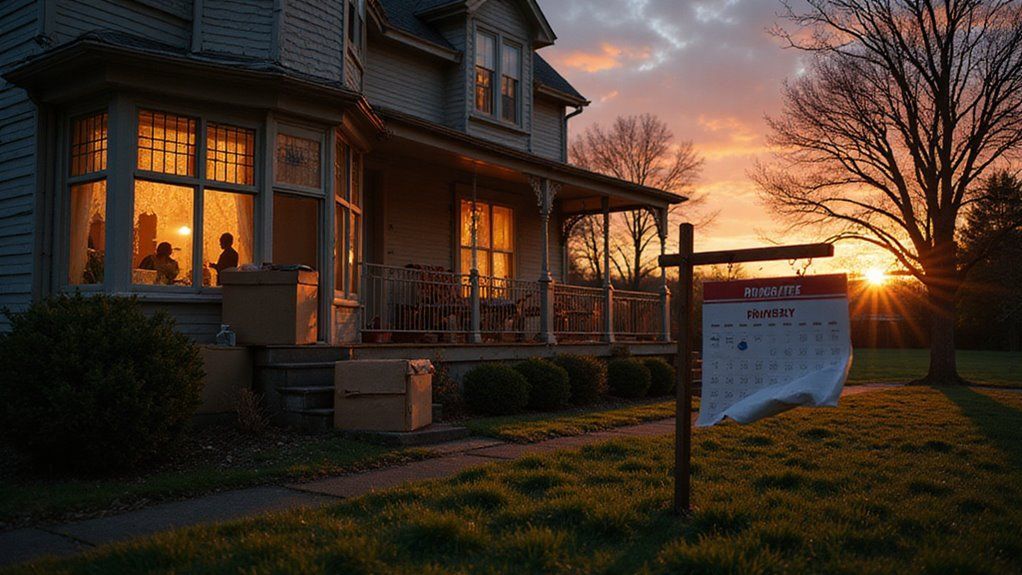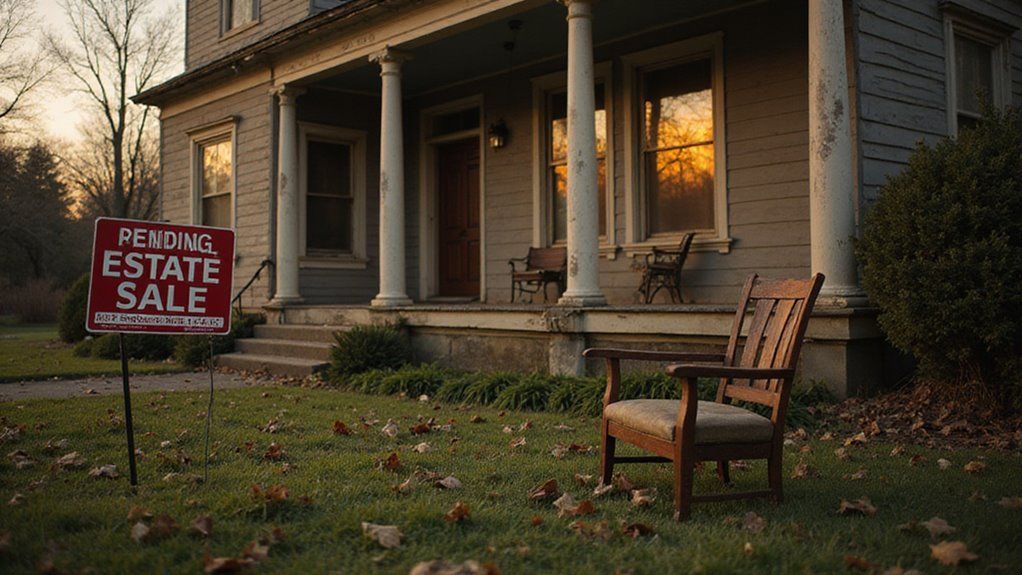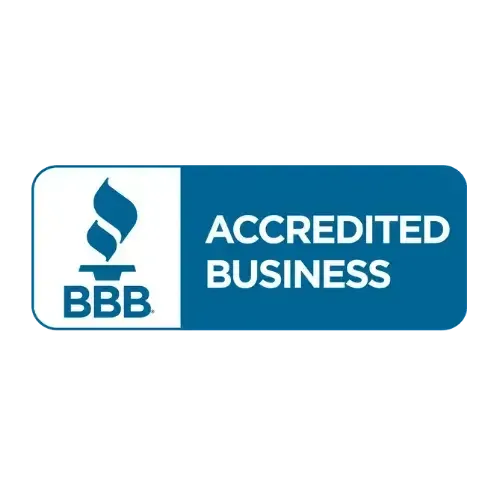How Long Can You Live in a House During Probate?

Facing eviction from a deceased loved one’s home while still grieving strikes fear into many families. Without understanding probate residency rights, you could be forced to vacate during an already emotional time. Securing proper permission and fulfilling financial obligations can protect your right to stay while the estate settles.
You can remain in a house during probate only with explicit permission from the executor. This permission isn’t guaranteed, even for beneficiaries, and depends on your willingness to cover ongoing property expenses.
In this blog I will explore everything about living in a house during probate proceedings.
What Happens to a House During Probate?
A house becomes part of the deceased’s estate and falls under probate court control. The executor manages who can live in or use the property during probate. This legal process restricts property access until debts are paid and assets distributed.
The executor has legal authority to make all decisions about the property.
Anyone wishing to remain in the home needs their permission. Unauthorized occupants may face eviction. Furthermore, the executor must protect the property value while settling estate matters.
Family members should communicate directly with the executor about residence plans. All occupancy agreements should be documented in writing.
As a result, everyone’s interests remain protected during this challenging transition period.
How Long Can You Stay in a Deceased Person’s Home?
Your ability to remain in a deceased person’s home hinges on three critical factors: whether you have a legal right to occupancy, what authority the executor holds over the property, and your status as an estate beneficiary.
In Pennsylvania, no law automatically grants you the right to stay just because you’re an heir or family member. The executor controls occupancy decisions during probate, and you’ll need their permission or a court order to legally remain in the house.
Legal Right to Occupancy
You have no automatic right to stay in a deceased person’s Pennsylvania home during probate. Legal residency requires permission from the executor or authorization from a court. Without these approvals, you occupy the property illegally, even as a beneficiary.
Executor approval grants temporary residency, while a court order provides legal protection. However, beneficiary status alone gives no automatic rights. Informal agreements remain legally non-binding.
Your continued occupancy depends on documented permission. You must also be willing to pay the mortgage and property taxes until the estate distributes the property.
Executor’s Authority
The executor controls who can live in the property during probate. Pennsylvania law gives executors full authority over estate assets, including homes. You need written permission to stay in the house while probate continues. Decisions must be fair to all beneficiaries.
Living in the home comes with responsibilities. You may need to pay for utilities, property taxes, and mortgage payments. The executor can end your occupancy if you don’t cover these costs. Always put all agreements in writing.
The Orphans’ Court supervises the probate process to ensure proper handling of the estate. This oversight helps protect everyone’s interests throughout this challenging time.
Estate Beneficiary Status
Beneficiaries must obtain agreement from all parties before occupying inherited property. This protects your legal position during probate proceedings.
You should work directly with the executor to document any temporary living arrangements. Financial contributions toward mortgage and utilities demonstrate good faith.
State laws vary regarding beneficiary occupancy rights during probate administration. Most importantly, never assume you have automatic residence rights. The executor holds legal authority over the property until distribution. Regular communication with all involved parties helps prevent potential conflicts.
Sell Your House Fast in Pennsylvania Without Expensive Repairs, Junk Removal, or Cleaning!!
We buy houses for cash in Pennsylvania! We will make you a Fast, Fair, Cash Offer To Buy Your House As-Is. There’s No Obligation To Accept. We are here to take the hassle out of selling your home.
What Factors Affect Living Arrangements During Probate?

Your living arrangements during probate depend on several concrete factors that determine whether you can stay in the deceased’s home. The executor’s decisions, your state’s specific probate laws, and whether a valid will exists all directly impact your occupancy rights.
Additionally, the estate’s mortgage obligations, property tax status, and agreements among family members will shape how long you’re permitted to remain in the property.
Size and Complexity of the Estate
Larger estates delay probate timelines. Multiple properties, significant debts, and contested assets complicate living arrangements during probate.
Pennsylvania estate procedures require full creditor claim resolution before property distribution. This process may extend from months to years.
Complex estates need court approval for major decisions. Disputes among heirs create additional waiting periods. The executor might need to sell assets to pay outstanding debts.
Consider getting legal help for temporary occupancy agreements. These agreements protect all beneficiaries’ interests during administration.
A qualified attorney can navigate complex estate situations effectively.
State-Specific Probate Laws
Probate laws vary significantly by state and govern how property transfers after death. Each state has its own probate code that determines executor powers, timelines, and beneficiary rights.
Some states follow the Uniform Probate Code, while others maintain unique systems. Court procedures differ widely across jurisdictions.
California and Florida typically have longer probate processes than Texas or Michigan. The executor must always follow local regulations regardless of family wishes.
Property occupancy during probate depends on state-specific statutes. Formal legal documentation protects all parties from future disputes.
Consulting with a local probate attorney provides the best guidance for your situation.
Presence of a Valid Will
A valid will significantly impacts who can live in the deceased’s home. Specific property bequests strengthen your right to remain in the residence.
When the will lacks occupancy instructions, the executor makes decisions based on estate administration needs. Life estate provisions guarantee your continued occupancy until your death.
If the will directs property sale, you must vacate when the sale concludes. Furthermore, clear occupancy directives always take precedence over informal arrangements.
The will’s exact language determines your legal standing as an occupant. To avoid uncertainty, consult with an estate attorney about your specific situation.
Mortgage and Property Tax Status
Mortgage and property tax payments must continue during probate. The executor is responsible for these payments to prevent foreclosure or tax liens. You may need to contribute toward these expenses if living in the property.
Lenders can start foreclosure regardless of the estate’s probate status. Tax liens take priority over inheritance claims. This means your inheritance could shrink if these obligations aren’t paid.
Failure to pay these debts might force a quick property sale. In other words, the home might be sold to cover outstanding debts.
Regular payments protect everyone’s financial interests during this transition period.
Family Dynamics and Agreements
Heir relationships determine who lives in inherited property during probate. When all heirs agree, specific family members can occupy the home through informal arrangements.
These agreements should be documented in writing and shared with the executor. Clear communication about expectations, expenses, and timelines improves the situation.
Without agreement, the executor must make decisions based on estate needs. Court guidelines often influence these decisions when conflicts exist. Family cooperation speeds up solutions, while disagreements cause delays.
Consider professional mediation for persistent disputes. This approach protects everyone’s interests while preserving family relationships throughout the probate process.
How to Navigate Mortgage Payments During Probate?
You’ll need to determine who’s legally responsible for making mortgage payments—typically the executor using estate funds—and inform the lender immediately about the homeowner’s death.
Contact the mortgage company to discuss your options, including significant forbearance agreements that can temporarily pause or reduce payments while probate proceeds.
If estate assets are insufficient, you may need to arrange alternative payment methods or face the possibility of foreclosure, making quick action essential to protect the property.
Identifying the Responsible Party
The estate is responsible for mortgage payments after death. The executor manages these payments using estate funds, not personal money. This protects the property from foreclosure while probate proceeds.
Executors must maintain mortgage payments with the deceased’s assets. Pennsylvania law requires Orphans’ Court approval for major financial decisions.
Beneficiaries living in the home may need to contribute until the property is distributed. Contact the mortgage company promptly. Arrange payment details with them directly. Proper management prevents additional fees and maintains everyone’s inheritance rights.
Communication with Lenders
Notify the mortgage lender within 30 days of death. This prevents foreclosure and establishes who’ll handle payments during probate.
Provide a death certificate and executor details when you contact them. Ask about their specific procedures for handling estates.
Mortgage payments and property taxes must be monitored monthly to prevent liens or default.
Get all payment arrangements confirmed in writing. If you live in the home, consider helping with these expenses. Your contributions protect the property’s value.
The orderly payment of obligations ensures all beneficiaries benefit from proper estate management. Regular communication with lenders maintains good standing throughout the probate process.
Forbearance Options
Mortgage lenders may temporarily reduce or pause payments for 3-12 months during probate. Contact the servicer right away to explain your situation. This option helps protect the property while the executor manages finances.
Request forbearance in writing with the death certificate and probate case number. Remember that all missed payments will become due after the forbearance period ends. Furthermore, beneficiaries might contribute toward payments during transitional periods.
Always consult the executor before making any arrangements since they control all estate financial decisions. Quick action is essential. Lenders respond more favorably to proactive communication than to missed payments.
Using Estate Assets
Estate funds can pay for ongoing mortgage payments during probate. The executor holds legal authority to make these payments. This protects the property from foreclosure while inheritance matters get resolved.
You need the executor’s help to stay in the home during probate. If the estate lacks sufficient funds, you may contribute toward mortgage costs with proper permission. These contributions might count against your inheritance share later.
Always document arrangements in writing through the Orphans’ Court. Furthermore, the executor must pay debts first according to legal requirements. Open communication about your housing needs helps everyone. This approach preserves estate value while ensuring fair distribution.
Can You Sell a House While in Probate?

You can sell a house during probate, but the executor must obtain court approval before listing the property. The sale process requires notifying all beneficiaries and, in many cases, securing their consent to ensure transparency and compliance with Pennsylvania Orphans’ Court rules.
Once approved, the executor manages the sale, with proceeds first paying outstanding estate debts before distribution to heirs.
Executor Sale Process
Pennsylvania executors can sell estate property during probate with Orphans’ Court approval. This authority balances beneficiary interests and estate debt resolution. Court approval protects all parties involved.
The required steps include filing a petition with the Orphans’ Court. All beneficiaries must receive notice of proposed sale terms. The court schedules a hearing where beneficiaries may object.
After approval, proceeds must first settle estate debts before distribution. For those living in the property, understanding possession timing is essential. Legal guidance throughout the process safeguards everyone’s rights and interests. Many executors find professional assistance valuable during this complex transaction.
Court Approval Requirements
Court approval is mandatory for selling estate property in Pennsylvania. You must petition the Orphans’ Court for authorization to sell. This petition needs to demonstrate why the sale serves the estate’s best interests.
The law requires supporting documentation including property appraisals, creditor notifications, and beneficiary disclosures. You must prove the sale price reflects fair market value. The court also verifies that proceeds will properly satisfy outstanding debts.
During this process, the court considers occupancy matters. They determine whether current occupants should vacate before closing. Alternatively, buyers might accept the property with occupants still present.
Proper authorization protects all parties from future legal challenges. This careful procedure helps families navigate difficult transitions during probate.
Beneficiary Consensus
Smart executors must build agreement among heirs to protect everyone’s interests. They should document all agreements about property use during probate. Regular mediation prevents costly court battles.
Financial reports and property appraisals must be shared with all beneficiaries. Executors can offer heirs options to buy others’ shares when some want to keep inherited property. This approach respects emotional attachments while being fair to everyone.
In essence, cooperation speeds up the settlement process. When beneficiaries work together, the estate closes faster and with fewer expenses.
Most probate delays result from unresolved conflicts among heirs rather than legal procedures.
What Are Your Housing Alternatives During Probate?
If you can’t remain in the house during probate, you’ll need to secure alternative housing quickly. Your options include temporary rentals, staying with family members, negotiating early estate distribution with the executor, or purchasing the home directly from the estate.
Each alternative has distinct legal and financial implications that require careful consideration based on your circumstances and the estate’s timeline.
Temporary Rental Arrangements
Four main options exist for temporary housing during probate. Month-to-month leases offer flexibility when settlement timelines vary. You can leave without penalty as soon as probate concludes.
Extended-stay hotels work well for uncertain timeframes. These accommodations include basic amenities without long-term commitments.
Staying with family or friends saves money during this challenging time. This option provides emotional support along with financial benefits.
Alternatively, you can rent directly from the estate at fair market value. All rental payments must cover property expenses like taxes, insurance, and maintenance.
Always document your arrangements in writing. Clear agreements protect everyone’s interests throughout the probate process.
Formal documentation prevents misunderstandings later.
Living with Family Members
Living with family during estate settlement can save money while waiting for inheritance. Temporary housing with parents or siblings helps maintain support networks when you need it most.
You should contribute to household expenses during your stay. Set clear departure timelines to prevent misunderstandings.
Document all financial agreements in writing to protect everyone involved. This documentation prevents future disputes among family members.
Rotating between relatives distributes the responsibility of hosting. This approach preserves estate funds and maintains healthy relationships throughout the settlement process. Family housing arrangements work best with open communication and mutual respect.
Early Estate Distribution
You can receive estate funds before final distribution to solve urgent housing needs. Request money directly from the executor for rental deposits or temporary housing costs. Keep all receipts and lease agreements as documentation.
Get other beneficiaries to agree in writing for faster court approval. The executor can provide advance payments from your inheritance share in many situations.
Estate law allows for early distributions when beneficiaries demonstrate genuine necessity. This approach satisfies immediate housing requirements while still following proper probate procedures.
Additionally, your attorney may file for emergency distributions in cases of financial hardship.
Purchasing the Home from the Estate
Buying the house directly from the estate offers permanent housing security. This solution addresses your occupancy needs while helping settle estate assets.
You’ll need court approval and an independent appraisal to ensure fair market value. All beneficiaries must receive proper notification before proceeding.
This approach immediately clarifies your living arrangements and eliminates uncertainty. You’ll need either financing or sufficient cash for the purchase.
Pennsylvania probate sales have specific legal requirements you must follow. The process involves paying closing costs and legal fees. These expenses contribute to settling the estate efficiently.
An attorney can guide you through the necessary steps. Their expertise protects everyone’s interests throughout the transaction.
Need to Sell a Probate Property Quickly? Contact Pezon Properties
Pezon Properties specializes in quick probate property purchases. We make cash offers within just 24-48 hours. Your property sells as-is with no repairs or cleanouts needed. We cover the closing costs so estate funds remain untouched.
Our team works directly with executors on court-compliant transactions. All legal requirements for probate property sales are carefully followed. This approach streamlines the settlement process considerably.
The entire experience becomes stress-free and efficient. For executors and beneficiaries facing difficult situations, our service provides welcome relief. Instead of lengthy traditional sales, you receive immediate resolution.
A Little About Pezon Properties
Pezon Properties is a local, family-owned home buying business that helps homeowners sell their properties quickly and easily without the stress of selling the traditional way.
We simplify the home selling process and eliminate the hassles that come with selling your home. You are provided with solutions, convenience, and a great customer experience. We are easy to work with and do fair, win-win deals.
We are not flippers or wholesalers looking to make a quick profit. We are from the Lehigh Valley and invest back into the community to make it a better place for us all to live. We have been working directly with our neighbors to buy homes since 2014.
Whether you are
tired of being a landlord, inherited a property that you do not want, are facing divorce or financial issues, or want to sell quickly without the headaches, reach out to us today and we will help you in any way we can.
484-484-0971.












